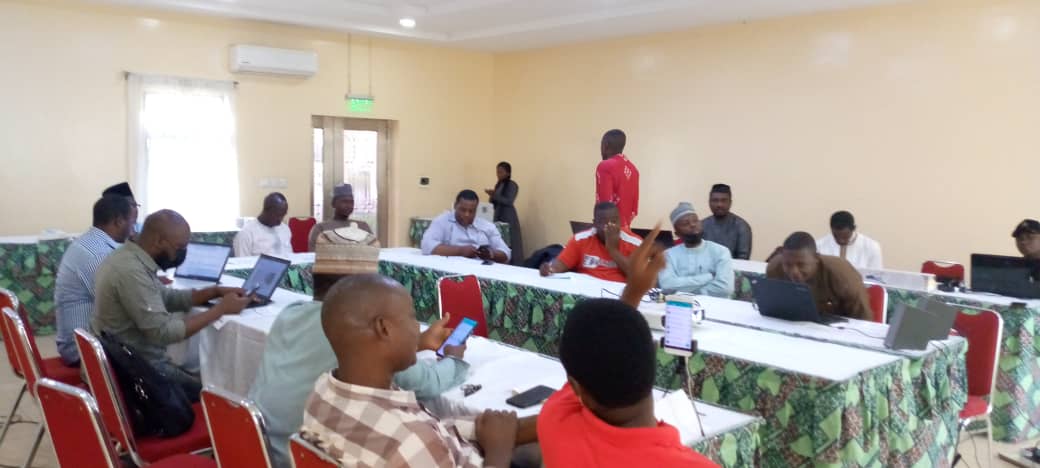In a bid to enhance participatory democratic governance and quality service delivery at the local government level in the country, Partnership to Engage, Reform and Learn (PERL), a United Kingdom-funded governance programme, during the week, engaged media executives in Kaduna, to mobilise support for the ratification of Constitutional Amendment Bills before the State Assembly.
Mr Abel Adejor, State Team Facilitator, while addressing participants during the engagement, reiterated that the media has a critical role to play in mobilizing the needed support for the ratification of the constitutional amendment bills before the state assembly, hence the event.
He described the media as a critical stakeholder in the scheme of things, given its huge influence in information dissemination and stressed the need for local government autonomy in the country
“From whichever angle one looks at it, local government autonomy would serve as a vital tool for the social, political and economic development of the country. It would bring true democratic dividends to the grassroots, as it would no doubt, improve education, healthcare, transportation and security”, he said, pointing out that the media also serves as a bridge between the government and the citizens.
Adejor said the media would be expected to use their various platforms to engage the powers-that-be and mobilise popular support for the ratification of the Constitutional Amendment Bills before the state assemblies.
According to him, the constitution is the most important document that guides the roles and function of the executive, legislature, and the judiciary as well as all the tiers of government.
“This engagement will broaden the knowledge of media practitioners on the importance of the constitutional review, the proposed amendments and how they can play their quota to ensure ratification by the Kaduna State Assembly.
“This is critical because the ratification of 24 states, representing two-third of the 36 states and the Federal Capital Territory is required for the autonomy to become a reality.”
On his part, Mr. Istifanus Akau, State Partnership Facilitator, PERL, explained that the meeting was for the media to develop strategies for effective engagement of members of the House of Assembly to ratify the bills, adding that the media would also be engaging policy makers and other critical stakeholders to influence the ratification of the bills transmitted to the Kaduna State House of Assembly.
“Another objective is to increase understanding on the functionality of the local government systems through financial and administrative autonomy,” he said.
He said that the 9th National Assembly had passed majority of the bills on priority issues canvassed by PERL and its partners in the ongoing constitution review process.
According to him a total of 68 bills were presented and considered by the National Assembly, of which 44, representing 65 per cent were passed.
“Two others were passed with some amendments, while 22, representing 32 per cent did not scale through. Two of the critical bills passed are the Local Government Administrative and Financial Autonomy Bills which seeks to create standard tenure for local government administrators, abolish Caretaker Committees.
“The Bills also abolished the Joint Allocation Account and made provision for direct allocation to local government councils. Another important bill is the Legislature and Legislative Bureaucracy Bill, to recognize the status of State Assembly Legislative Service Commission, for the implementation of State Assemblies financial autonomy.
“Other bills are Institutional Strengthening Bill, Establishment of State Security Council Bill, and timeframe for the submission and passage of the federal and state budget to enhance budget performance among others,” he remarked.
Mr Yusuf Goje of the Coalition of Associations for Leadership, Peace, Empowerment and Development (CALPED) noted that strong institutions were needed for any democracy to work effectively.
“Local Government Administrative and Financial Autonomy are very critical in improving service delivery at the local government level. The local government autonomy bills, along with others before the State Assemblies, were to strengthen the institutions of governance through a legal framework.
“Other than that, local government autonomy would guarantee quality service delivery and true democratic governance in the rural areas. The quality of education and teacher motivation would be greatly enhanced as salaries would be paid without any form of bottle-necks and bureaucracy. Local government autonomy would improve transparency and accountability”, Goje reasoned.
Mr Martins Dangwa Abbas, a strong advocate of local government autonomy told NATIONAL ACCORD in an interview that the kind of autonomy being canvassed must be truly autonomous.
“We are talking about autonomy with authority. The constitutional provision that subjected local governments under the dictates of states, denied the nation the much orchestrated federal character, as state governments have hijacked the resources that should accrue to the third tier of government, which is closest to the people. It is unfortunate that a good number of state governors across the country, have maintained a strong hold on the local governments. They use the local councils as platforms for patronage to their lackeys, loyalists and political thugs.
“The inability of local governments to perform effectively and credibly, especially in the areas of social service delivery, has largely been due to the excessive control exerted by the state executive. Local governments in Nigeria presently have fiscal sustainability constraints because most of their responsibilities and duties have been hijacked by the state governments.
“There is this false narrative being amplified that local government councils are incapable of independently managing their affairs and delivering on the basic social services without the state governments. That is not true”, Abbas summed up.






